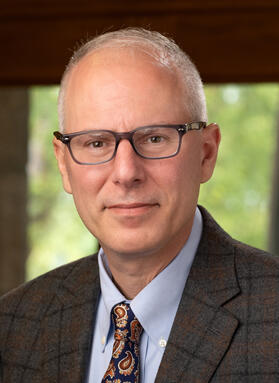
A leader in the field of organic chemistry, Miller has received international recognition for his work in the synthesis of stereochemically complex structures.
Scott Miller, a leader in the field of organic chemistry who has received international recognition for his groundbreaking work in the synthesis of stereochemically complex structures, was recently appointed the Sterling Professor of Chemistry, effective immediately.
A Sterling Professorship is considered the highest academic honor a Yale professor can receive.
Miller, who joined the Yale faculty in 2006, is a member of Faculty of Arts and Sciences (FAS) in the Department of Chemistry.
His research centers on the development of new methods for the synthesis and derivatization of complex molecules. This work encompasses reaction design, development, and application to discover new reactions for the selective synthesis of complex molecules. His research has also shed new light on the catalytic modification of natural products.
Miller’s efforts in controlling catalyst conformational dynamics and harnessing weak, non-covalent interactions have resulted in significant contributions to the field of asymmetric catalysis based on novel catalysis concepts. He has also brought the principles of enantioselective catalysis to other types of selectivity challenges in synthetic chemistry, with particular attention to natural product diversification.
His work has wide-ranging implications on the concept of late-stage functionalization of complex bioactive compounds. This work has established new strategies for the diversification of synthetic and naturally occurring scaffolds for study in medicinal chemistry. His research group is currently supported by a number of different grants from the National Institutes of Health (NIH), the National Science Foundation, and over the years, by a number of pharmaceutical and biotech companies. He has been an author on more than 200 peer-reviewed publications, and his research group’s work on bioactive compound functionalization has garnered attention worldwide.
Miller has received numerous national and international awards in his field, including the Max Tishler Prize, the Yoshimasa Hirata Memorial Gold Medal, a National Institutes of Health MERIT award, a National Science Foundation Career award, and multiple awards from the American Chemical Society. He is an elected member of the National Academy of Sciences, the American Academy of Arts and Sciences, and a Fellow of the American Chemical Society, and the American Association for the Advancement of Science. He has held named lectureships at the University of Illinois at Urbana-Champaign, the University of California-Berkeley, The University of Wisconsin in Madison, Brandeis University, The Scripps Research Institute, the Swiss Chemical Society, Harvard University, Northwestern University, and numerous other institutions.
His contributions to the field have also stimulated a number of advisory roles for public and private concerns, including the Board of Chemical Sciences and Technology of the National Academies, and service for various funding agencies including as a member and chair of the “Synthetic and Biological Chemistry B” study section of the NIH, and as a member on the National Institute of General Medical Sciences Advisory Council. He is the editor-in-chief of The Journal of Organic Chemistry and is on the editorial advisory boards of Organic Letters and Accounts of Chemical Research.
An outstanding mentor and teacher, Miller’s numerous graduate student and postdoctoral advisees have gone on to hold high-profile tenure-track positions in academia and roles in industry. He is active in the recruitment, mentoring, and education of graduate and undergraduate students in the chemistry department. Miller has played a significant leadership role in the sciences at Yale: he served as chair of the Department of Chemistry for six years and as the FAS Divisional Director for Science from 2015 to 2017.
Miller earned a bachelor’s degree, master’s degree, and his Ph.D. from Harvard.